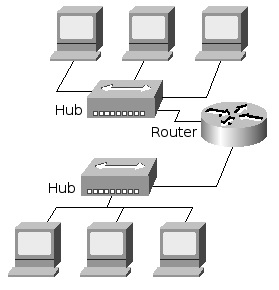
 Data Structure
Data Structure Networking
Networking RDBMS
RDBMS Operating System
Operating System Java
Java MS Excel
MS Excel iOS
iOS HTML
HTML CSS
CSS Android
Android Python
Python C Programming
C Programming C++
C++ C#
C# MongoDB
MongoDB MySQL
MySQL Javascript
Javascript PHP
PHP
- Selected Reading
- UPSC IAS Exams Notes
- Developer's Best Practices
- Questions and Answers
- Effective Resume Writing
- HR Interview Questions
- Computer Glossary
- Who is Who
What are the differences between Hub and Router?
Let us understand the concepts of Hub and Router before learning the differences between them.
Hub
Hubs work at the Physical layer and are used to link all the devices connected to it to form a single network. It is a common connection point All the devices connected to the hub can see the packets sent out by the hub.
Advantages
The advantages of Hub are as follows −
Hub is less expensive when compared to switches and routers.
A Hub is used to internally connect between systems in a network.
Disadvantages
The disadvantages of Hub are as follows −
A hub cannot accommodate more devices which make it limited to small networks.
Bandwidth sharing, If a hub offers 100 Mbps and 5 devices are connected to the hub then each device can have a maximum BW of 20 Mbps.
A Hub is a non-intelligent device, which can send the packets from one system to another system, and the other system gets the copies of those packets, because it doesn't read the Mac Address. Therefore, it is called a non-intelligent device.
Routers
Routers are used at the network layer.
Routers are used to connect two different networks. Router devices communicate with other routers to decide the best path to transfer the data.
Router devices are used to connect the LAN and WAN networks.
Advantages
The advantages of router are as follows − Routers can find the shortest and easiest path to transmit the data (information between sending and receiving computers) without any disturbance.
Data can be transferred between any types of networks (for example LAN and WAN).
Use of routers results in less collision as the router has a domain.
Routers offer more connectivity to the devices than switches or hubs.
Disadvantages
The disadvantages of router are as follows − Routers are more expensive when compared to gateways and switches.
In case of static routing, network administrators must manually update the users of the network in the routing table.
Installation and maintenance of routers is difficult as routers are very complicated.
Given below is the pictorial representation of router and hub −

Differences
The major differences between Hub and Router are as follows −
| Hub | Router |
|---|---|
| It is nothing but primarily a repeater multiport. | It is nothing but a system such as a switch which will be routing packets of data by IP address. |
| Hubs will not be filtering data, hence packets of data will be sent to every linked device. | It is nothing but device of link layer network. |
| Active, passive and intelligent hubs are different kinds of hubs. | Wired, Wireless, Core and edge, Virtual routers are different kinds of routers. |

